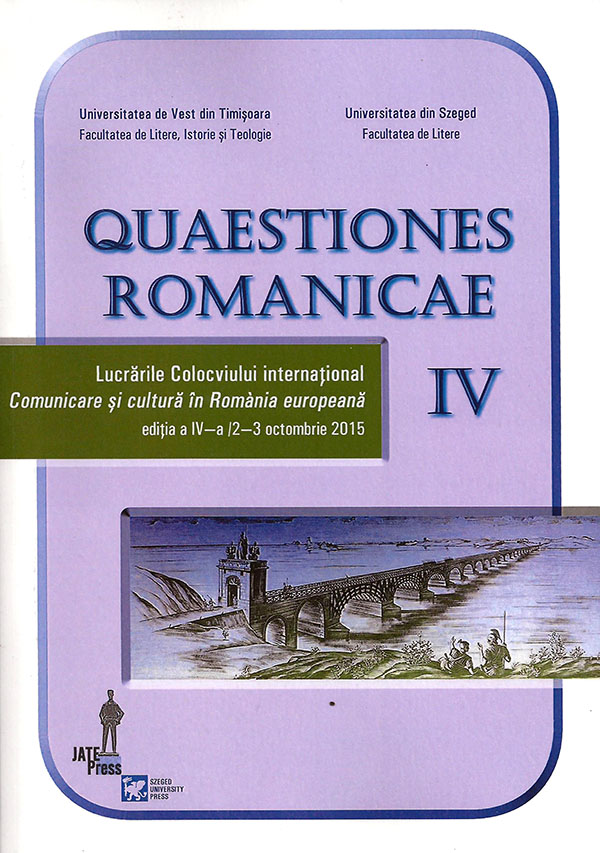Eugeniu Coșeriu și Gheorghe Ivănescu. Mari concepte ale lingvisticii
Abstract: (Eugeniu Coșeriu and Gheorghe Ivănescu. Great concepts of linguistics) In Romanian linguistics the theoretical vocation manifests in the works of Eugeniu Coşeriu, belonging to the Romanian diaspora, Sextil Puşcariu and Gheorghe Ivănescu. They have not developed or applied the most significant theories of general linguistics but they have created themselves a linguistic doctrine with strong explanatory meanings, Eugeniu Coşeriu being, moreover, in this regard, the linguist who thought the language in all its complexity in what he called integral linguistics. Eugeniu Coșeriu and Gheorghe Ivănescu have a high affinity, because they belong to The Linguistics School of Iași, even if Coşeriu studied only one year in Iasi. We intend to dwell on what seemed to be more revealing from the works of the two linguists, i.e. some concepts with the aspiration to solve the fundamental problems of the study of linguistics: regarding the linguistics of Coșeriu, the trichotomy speech – language –discourse, and three types of linguistics: the linguistics of speech, the linguistics of languages, the linguistics of discourse, and, in the case of George Ivănescu, the concept of "the linguistics of literary languages" that opposes "the linguistics of popular languages", a fundamental dichotomy for linguistic diachrony. Moreover, the relationship between the thinking of Eugeniu Coşeriu and Gheorghe Ivănescu began to be under discussion and it distinguishes an important issue for the current Romanian linguistics: the recovery of the integral linguistics in Romania.
Keywords: Eugeniu Coşeriu Eugene, Gheorghe Ivănescu, Romanian linguistics and the theoretical perspective, the linguistics of literary languages, the linguistics of popular languages, the linguistics of speech – the linguistics of languages – the linguistics of discourse, speech – language – discourse.
Rezumat: Vocația teoretică în lingvistica românească se manifestă exemplar în opera lui Eugeniu Coșeriu, aparținând diasporei românești, și la Sextil Pușcariu și Gheorghe Ivănescu. Ei nu au dezvoltat sau aplicat teoriile cele mai semnificative din lingvistica generală, ci au creat ei înșiși o doctrină lingvistică, cu puternice valențe explicative, Eugeniu Coșeriu fiind, de altfel, în această privință, cel care a gândit limbajul în toată complexitatea sa în ceea ce el a numit lingvistica integrală. Eugeniu Coșeriu și Gheorghe Ivănescu au afinități referitoare la faptul că se leagă de Școala lingvistică ieșeană, chiar dacă E. Coșeriu a studiat numai un an la Iași. Ne propunem să ne oprim asupra a ceea ce ni s-a părut că este mai revelator în opera celor doi lingviști, la unele concepte cu aspirația de a rezolva studierea unor probleme fundamentale ale lingvisticii: în ceea ce privește lingvistica lui Eugeniu Coșeriu, tricotomia vorbire – limbă – act lingvistic (sau discurs), și cele trei tipuri de lingvistică, lingvistica vorbirii, lingvistica limbilor și lingvistica discursului, iar, în cazul lui Gheorghe Ivănescu, conceptul de „lingvistică a limbilor literare”, care se opune „lingvisticii limbilor populare”, dicotomie fundamentală pentru diacronia lingvistică. De altfel, relația dintre gândirea lui Eugeniu Coșeriu și a lui Gheorghe Ivănescu a început să fie luată în discuție și ea distinge o problemă importantă pentru lingvistica românească actuală: recuperarea lingvisticii integrale în România.
Cuvinte-cheie: Eugeniu Coșeriu, Gheorghe Ivănescu, lingvistica românească și perspectiva teoretică, lingvistica limbilor literare și lingvistica limbilor populare, lingvistica vorbirii – lingvistica limbilor – lingvistica discursului, vorbire – limbă – act.
